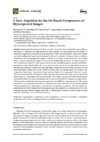Please use this identifier to cite or link to this item:
https://accedacris.ulpgc.es/jspui/handle/10553/41380
| Title: | A new algorithm for the on-board compression of hyperspectral images | Authors: | Guerra, Raúl Barrios Alfaro, Yubal Díaz Martín, María Santos, Lucana López, Sebastián Sarmiento Rodríguez, Roberto |
UNESCO Clasification: | 220990 Tratamiento digital. Imágenes 220921 Espectroscopia |
Keywords: | Hyperspectral compression Lossy compression On-board compression Orthogonal projections Gram–Schmidt orthogonalization, et al |
Issue Date: | 2018 | Project: | European Initiative to Enable Validation for Highly Automated Safe and Secure Systems Iniciativa Europea Para Facilitar la Validacion de Sistemas Seguros y Altamente Automatizados Sistemas Electronicos Empotrados Confiables Para Control en Ciudades Bajo Situaciones Atipicas |
Journal: | Remote Sensing | Abstract: | Hyperspectral sensors are able to provide information that is useful for many different applications. However, the huge amounts of data collected by these sensors are not exempt of drawbacks, especially in remote sensing environments where the hyperspectral images are collected on-board satellites and need to be transferred to the earth's surface. In this situation, an efficient compression of the hyperspectral images is mandatory in order to save bandwidth and storage space. Lossless compression algorithms have been traditionally preferred, in order to preserve all the information present in the hyperspectral cube for scientific purposes, despite their limited compression ratio. Nevertheless, the increment in the data-rate of the new-generation sensors is making more critical the necessity of obtaining higher compression ratios, making it necessary to use lossy compression techniques. A new transform-based lossy compression algorithm, namely Lossy Compression Algorithm for Hyperspectral Image Systems (HyperLCA), is proposed in this manuscript. This compressor has been developed for achieving high compression ratios with a good compression performance at a reasonable computational burden. An extensive amount of experiments have been performed in order to evaluate the goodness of the proposed HyperLCA compressor using different calibrated and uncalibrated hyperspectral images from the AVIRIS and Hyperion sensors. The results provided by the proposed HyperLCA compressor have been evaluated and compared against those produced by the most relevant state-of-the-art compression solutions. The theoretical and experimental evidence indicates that the proposed algorithm represents an excellent option for lossy compressing hyperspectral images, especially for applications where the available computational resources are limited, such as on-board scenarios. | URI: | https://accedacris.ulpgc.es/handle/10553/41380 | ISSN: | 2072-4292 | DOI: | 10.3390/rs10030428 | Source: | Remote Sensing [ISSN 2072-4292], v. 10 (3), 428, (2018) |
| Appears in Collections: | Artículos |
SCOPUSTM
Citations
41
checked on Jun 8, 2025
WEB OF SCIENCETM
Citations
37
checked on Feb 1, 2026
Page view(s) 5
353
checked on Jan 15, 2026
Download(s)
214
checked on Jan 15, 2026
Google ScholarTM
Check
Altmetric
Share
Export metadata
Items in accedaCRIS are protected by copyright, with all rights reserved, unless otherwise indicated.
